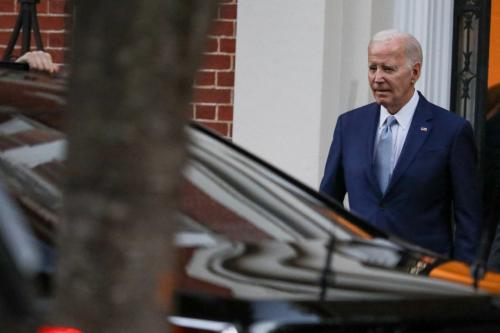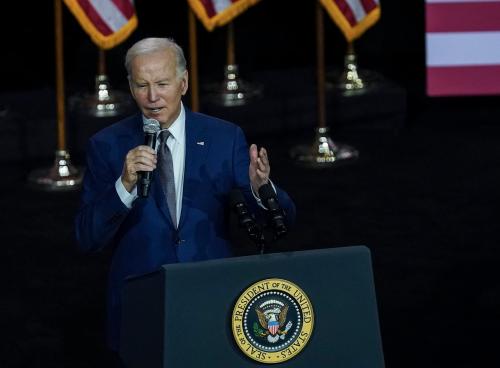Going into the Republican debate in Iowa the race remained, as it has all year, Trump’s to lose. Trump maintains a formidable lead among Republican voters — 61% and no one even comes close — Gov. Ron DeSantis and former U.N. Ambassador Nikki Haley are tied at around 10% of the vote. That’s also the story when it comes to money where Trump has been way ahead of the field. At the end of the third quarter Trump had raised twice as much as DeSantis and about three times as much as Haley. Trump’s lead, while still huge, is a bit less in the early primary states. In Iowa, Trump is at around 52% with DeSantis and Haley close to each other but still under 20% in most polls. DeSantis has put everything he has into Iowa — a loss there may well doom his campaign going forward. In a campaign nothing is more valuable to a candidate than free media. And on that metric as well our tracker shows that Trump is far ahead of his opponents. In fact, he gets more free media than the incumbent president of the United States.
Because of Trump’s overwhelming lead, the race has been and remains today a race for the number two slot, with the possibility looming that someone could emerge to take on Trump for the nomination. Along the way many, candidates have dropped out. The latest is former New Jersey Gov. Chris Christie, whose full-throated attacks on Trump gained him great admiration from Democrats and a small number of Republicans — though too small a number to make winning the nomination feasible for him. But where his support goes could have a major impact on voting in New Hampshire.
So last night the race came down to three people: Trump, who refused to debate but who, as in other Republican debates, conducted his own event on Fox News; Florida Gov. Ron DeSantis; and former Ambassador Nikki Haley.
On Fox TV
On the Fox town hall, Trump was toned down. With the first votes of the season only days away, it looked as if he was working hard to reassure voters that he would be a safe choice rather than a threat to political institutions or to his enemies. Surprisingly, he pulled back on his often-repeated promise to deliver “retribution” for the perceived wrong perpetrated against him and his supporters. “I’ll be too busy for retribution,” he said. And besides, success is the best retribution. If he maintains this demeanor, which he has not been able to do in the past, he could prove to be a more formidable general election candidate than many Democrats believe.
Looking ahead to the general election, Trump previewed the case he would make. Paraphrasing his message, it went something like this: Under my leadership, we had a strong economy, low inflation, low gas prices, and energy independence. There were no new wars on my watch, and I had Iran on the ropes. I rebuilt the military and carried out a policy of peace through strength. I’ve been accused of being the chaos candidate, but Biden is the real chaos candidate. Look at the economy, the border, the outbreak of war and instability. This wouldn’t have happened on my watch. And Biden’s electric vehicle mandate makes no sense; soon China will be building most of them.
Trump offered relatively few personal attacks on Biden. He referred only once to Biden’s alleged mental decline and claimed in passing, without providing any evidence, that the president had gotten money from China and the wife of Moscow’s mayor. Trump conveyed confidence that he could run successfully on his record and that Biden’s weaknesses would speak for themselves.
Prompted by voters’ questions, he offered vague glimpses of his plans for a second term. He promised to finish the wall, shut down the southern border, reinstitute the “Remain in Mexico” policy, and undertake the biggest deportation effort in the nation’s history. Asked what he would do about sanctuary cities, he predicted that Democratic mayors would take the lead to end them because the cost of caring for illegal immigrants was prohibitive.
Toward the end of the town hall, a woman who opposes abortion told Trump that she was troubled by his attack on DeSantis’s six-week limit on abortion. He replied, as he has before, that if it weren’t for his Supreme Court appointments, we wouldn’t be having this discussion, adding that after just six weeks, many women don’t even know that they’re pregnant. He said that he favored “Ronald Reagan’s exceptions” for rape, incest, and the life of the mother. But he wants to leave these decisions to the governors; on this issue, he was a “federalist,” not a nationalist. He also noted that Republicans couldn’t advance this issue unless they win elections, and to do this, some compromises would be necessary.
Trump spent some time trying to dispel charges that if reelected, he would undermine democracy and the rule of law. Previously, he had said he would be a “dictator for a day,” which means issuing executive orders to close the southern border and to authorize drilling for oil in places that are now off limits. But in the town hall he walked back his earlier statement about wanting to be a dictator.
On CNN
While Trump was speaking, the race for number two was on over at CNN where Ron DeSantis and Nikki Haley faced off with Christie’s departure clearly on their minds. Much of the time with them was spent throwing charges back and forth at each other about their records, seeking to gain an edge. The problem was that while the opposition researchers had clearly loaded them up with facts and figures, it was impossible for the average voter to figure out who was right and who was wrong. Haley kept directing people to a website called DeSantislies.com. This was an indication that her campaign understood that the back and forth would be tough to follow.
Both candidates, however, were polished and articulate — illustrating the fact that the trial by fire of debates does turn people into better candidates. DeSantis was a little less stiff than in previous debates and Haley was impressive in her mastery of the arguments. DeSantis kept repeating that, unlike Trump and Haley, he could deliver, and he touted his actions in Florida on a variety of fronts. But his performance suffered from a series of what were so obviously pre-packaged lines, such as: “Ballistic podiatry — shooting herself in the foot.”
Haley’s theme was that she was a new generation and that character matters. In one statement, she said, “I don’t have vengeance, I don’t have vendettas,” a clear reference to Trump’s tendency to wallow in the past and engage in grievance politics. As in previous debates, her mastery of foreign affairs stood out and helped make her look quite presidential.
In addition to dredging up examples from each other’s records to illustrate how much better they were on issues important to the Republican base (such as transgender persons, the border wall, and China), they rarely talked about Trump. When they did, they complained about his failure to enact some policy and continually maintained that Trump himself should have been on the stage. Occasionally, they paused the confusing attacks on each other and made a strong, coherent case. The Biden campaign should take note of their exchanges on immigration and be ready for what will be a powerful attack. Haley, the child of legal immigrants said, “My mother used to say, ‘If they don’t follow the laws when they come into the country, they won’t follow the laws when they are here.’”
For some reason (perhaps it tested well in Iowa), Haley pounded DeSantis for having run a poor campaign — spending $150 million with little to show for it.
And Haley came out squarely against the January 6 insurrection — saying it should never happen again, while DeSantis avoided a direct answer.
As in previous debates, none of the remaining candidates made the kind of strong case against Trump that Chris Christie has made and that Democrats and some members of the press want the remaining candidates to make. But how do they get Christie’s support without aggravating the Trump base? A serious run for the Republican nomination will require, at some point in time, converting at least a few Trump voters to their cause.
So, as the real contest begins today, we have three serious candidates remaining (not counting Vivek Ramaswamy). Trump is still dominant, Haley is ascendant and gaining steam, and DeSantis, who appeared to be in a free fall a few weeks ago, is perhaps leveling off. In recent weeks, Haley has increased her free media by 911% in our tracker — a testimony to the increased interest in her campaign as a result of her polling numbers and her strong debate performances.
In New Hampshire, Trump stands at 42% among Republicans – lower than in the national polls and lower than in Iowa. It’s there that Haley has been gaining ground since October. She now has about 30% of the vote in FiveThirtyEight’s average of polls. She runs ahead of Christie and well ahead of DeSantis. With Christie gone, Haley should get some of his vote and perhaps be able to beat Trump there (or at least come close).
The unknown but critical question is where the Christie voters will go and how much of it will benefit Haley. If she is able to consolidate the non-Trump vote in New Hampshire, the Granite State could produce a major surprise and propel her into a dramatic showdown with Trump in her home state of South Carolina on February 24.
As Haley gains momentum in New Hampshire, she picked up some wealthy supporters, among them Americans for Prosperity Action, a powerhouse group affiliated with the Koch brothers. Although we don’t have official numbers from the Federal Election Commission yet, the Haley campaign announced in December that they had attracted 83,000 new donors who contributed $24 million dollars. Of course, Trump and DeSantis have also increased their fundraising, but, if accurate, this is a significant haul for Haley, who as of the end of the third quarter had raised a total of $19 million.
Having money to run in the very expensive primaries that will take place on Super Tuesday is very important for a candidate. While the free media is priceless, it takes money to build out a campaign that runs ads and goes door-to-door in the set of big states that will vote on March 5.
As we come to the end of the invisible primary, we find a three-way race that favors Trump but with some of the ingredients that could make for a dramatic upset in coming weeks.
The Brookings Institution is committed to quality, independence, and impact.
We are supported by a diverse array of funders. In line with our values and policies, each Brookings publication represents the sole views of its author(s).









Commentary
Haley’s strong bid for second place in the Iowa debate
January 11, 2024